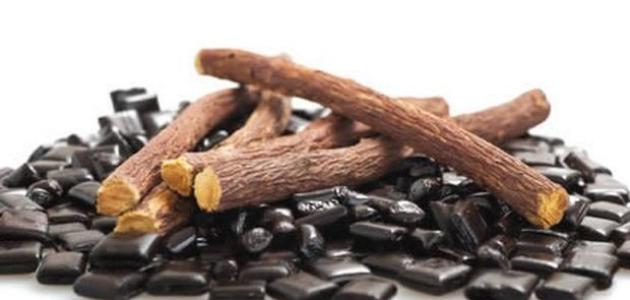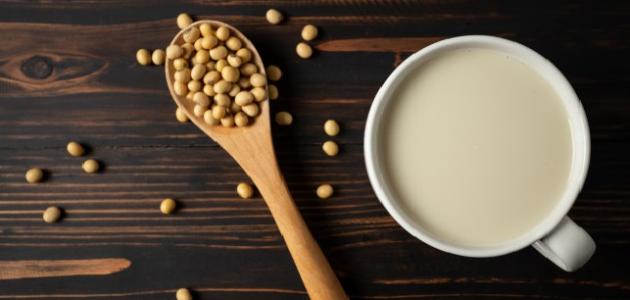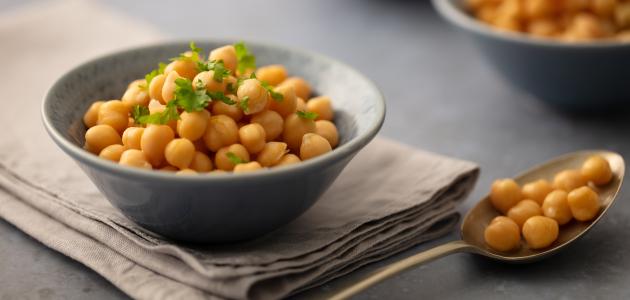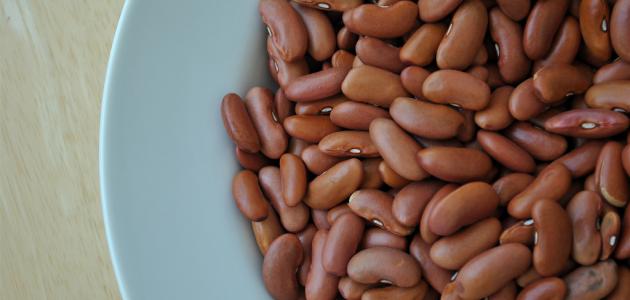Contents
- 1 licorice
- 2 The nutritional value of licorice
- 3 Damages licorice
- 4 common questions about licorice
- 5 References
Licorice
Licorice is a perennial plant that belongs to the leguminous family, and bears purple and white flowers, and it originates from the Mediterranean, Central and Southwestern Asia, and licorice is widely cultivated to extract its roots that grow at a depth of 1.2 meters. The roots are perennials that are round and long in shape, and are distinguished by their strong texture with a gray color on the outside and yellow on the inside, and a sweet taste. The licorice plant is available in many forms in the markets such as chewable or sucking tablets, capsules, extracts, teas , tinctures, and root powder. [1] [2]
The nutritional value of licorice
The following table shows the most important nutrients in 100 grams of licorice: [3]
| The food component | Quantity |
|---|---|
| water | 6.3 milliliters |
| energy | 375 calories |
| Fats | 0.05 g |
| Carbohydrates | 93.55 grams |
| Fiber | 0.2 g |
| Sugars | 70 grams |
| Calcium | 3 milligrams |
| Iron | 0.13 milligram |
| Magnesium | 2 milligrams |
| Phosphorous | 4 milligrams |
| potassium | 37 milligrams |
| sodium | 50 milligrams |
| Zinc | 0.05 milligram |
| Copper | 0.028 milligram |
| Selenium | 1.1 mcg |
| Vitamin B1 | 0.004 milligram |
| Vitamin B2 | 0.011 milligrams |
| Vitamin B3 | 0.008 milligram |
| Vitamin B6 | 0.004 milligram |
Licorice benefits according to the degree of effectiveness
Possibly Effective
- Relieving the symptoms of indigestion: Eating licorice root may help relieve the pain associated with functional dyspepsia , a chronic disorder that causes discomfort in the upper abdomen, [2] as a study published in Digestion In 2004, the use of extracts of several herbs, including licorice root, relieved symptoms associated with indigestion. [4]
There is insufficient evidence of its effectiveness
- Reducing cholesterol levels in the blood: Taking licorice root extract may contribute to lowering cholesterol levels in patients who suffer from high levels of hypercholesterolemia , as this plant possesses antioxidant properties; Thus, it reduces the risk of cardiovascular disease, according to a study published in Nutrition in 2002. [5]
- Reducing potassium levels in the blood: Some research indicates that some compounds in the licorice plant may contribute to reducing potassium levels in diabetics , and the kidneys, [6] but it is worth paying attention if potassium levels are already low in the body. Weevils may reduce them significantly, so it is advisable to avoid eating them in this case. [7]
- Reducing rheumatoid arthritis: , as licorice plant extract and extract of its roots reduce the risk of oxidative damage in the liver and kidney tissues, which reduces acute inflammation and chronic inflammation such as rheumatoid arthritis, according to a study published in The Journal of Biomedicine and Biotechnology in 2010, the study also indicated that licorice root extract produced better results than the licorice extract itself. [8]
- Reducing Familial Mediterranean Fever: It is a genetic immune disorder that causes frequent high temperatures, and painful inflammation of the abdomen, lungs, and joints, [9] and it has been found that taking extracts of some herbs; Including licorice, it may contribute to relieving familial Mediterranean fever, according to one study published in Phytomedicine in 2003. [10]
- Reducing the risk of developing PCOS: , as taking licorice extract contributes to reducing the risk of developing PCOS , by regulating the levels of the hormones related to it, according to a study conducted on mice and published in the Journal of Integrative Medicine Research 2018. [11]
- Reducing muscle spasms: a mixture of herbs containing licorice extract may contribute to relieving skeletal muscle spasm in dialysis patients. Muscle spasm is a common symptom of this group of patients, according to a study conducted on mice and published in The American Journal of Chinese Medicine in 2003. [12]
- Other benefits: Taking licorice may be beneficial for people with some health problems, but there is insufficient evidence of its effectiveness in reducing or reducing the risk of infection, and among these health problems the following: [6]
- Abnormal change in levels of the hormone prolactin, or what is known as the milk hormone.
- Bleeding
- Cough.
- Chronic Fatigue Syndrome.
- Infection.
- Sterility.
- Lupus .
- Malaria.
- Pain in general.
- Prostate cancer .
- Psoriasis.
- tuberculosis.
The benefits of licorice for the stomach
- Reducing the risk of stomach germs: Helicobacter pylori is a bacterium that causes stomach ulcers in some people. Research has shown that licorice extract may contribute to reducing the Helicobacter pylori bacteria. [13] In one study that Published in The Brazilian Journal of Infectious Diseases in 2016, it was found that consuming licorice in combination with using a physician-prescribed treatment to eliminate H.pylori may improve the bacterial reduction better, especially in those with stomach ulcers . [14]
- Relieve stomach ulcers: Studies have differed regarding the benefit of licorice plant in relieving heartburn. One study published in The Practitioner showed that chewing licorice tablets on an empty stomach may help relieve stomach ulcers, [15] while another study published in the journal Gut indicated that licorice had no effect on stomach ulcers. [16]
Licorice benefits for the liver
Licorice may reduce the risk of developing non-alcoholic fatty liver disease, as taking licorice root extract has been shown to reduce levels of liver enzymes, whose elevation is a sign of non-alcoholic fatty liver disease. And that is in one of the studies published in Phytotherapy Research in 2012, and it is worth noting that this benefit still needs more studies to prove it. [17]
Licorice benefits for colon
Licorice may be useful for relieving symptoms of irritable bowel syndrome. It has been observed that consuming a specific mixture of herbs containing licorice plant may contribute to relieving symptoms of irritable bowel syndrome in those suffering from persistent constipation due to it, according to a study published in The Journal of Alternative and Complementary Medicine in 2006, and it should be noted that these The benefit is still in need of more studies to prove it specifically on licorice. [18]
Licorice benefits for diabetics
The licorice plant contains some compounds that have the ability to reduce blood sugar levels, as well as provide anti-inflammatory properties. [19] A study in diabetic mice published in the Journal of Rafsanjan University of Medical Sciences in 2007 showed that an extract Licorice root may contribute to reducing blood sugar levels, and it can also be used as a food sweetener for diabetics, while blood sugar levels were not affected in non-diabetic mice. [20]
Licorice benefits for women
Licorice root is used by women to relieve menstrual cramps , and it is also believed that it may help relieve menopause symptoms, such as hot flashes, and it has been shown that the licorice plant contains compounds called phytoestrogens , which are compounds similar in effect to the hormone estrogen, and a study published in Health Care for Women International in 2014 showed that consuming licorice may significantly reduce the duration of hot flashes, although this benefit is still needed. More studies to prove it. [2] [21]
Harms of licorice
The degree of safety of licorice
Licorice is often considered safe for most people when consumed in moderate quantities, while it is safe to eat it in large quantities as in therapeutic doses, but it is possible that it is not safe to eat it in large quantities for a period of more than four weeks, or in smaller quantities for a long period, and for pregnant women it is considered to take licorice Unsafe; Eating more than 250 grams of it per week during pregnancy may increase the risk of premature labor, or the occurrence of miscarriage , and there is insufficient information about the degree of safety of licorice for breastfeeding women. Therefore, it is advised to avoid taking it during breastfeeding. [6]
Precautions for using licorice
Some people should be careful when consuming licorice plant in order to avoid its side effects, and we mention from these groups the following: [7]
- Heart patients: Taking licorice leads to water retention in the body, which may worsen the congestive heart failure in those with it, and it may lead to an irregular heartbeat. Therefore, heart patients are advised to avoid consuming the licorice plant.
- Those with hormone-sensitive conditions: such as breast cancer , uterine cancer, ovarian cancer, or uterine fibroids , as the licorice plant may act as estrogen in the body as mentioned previously, which may worsen these sensitive cases It has hormones such as estrogen, so it is advised to avoid licorice in these health conditions.
- People with hypertonia: , as eating the licorice plant may lead to a decrease in potassium levels in the blood, and thus worsen the condition of people with hypertonia.
- People with low levels of potassium in the blood: As mentioned previously, consuming licorice reduces potassium levels in the body, so it is advised to avoid consuming it if potassium levels in the body are low.
- People with high blood pressure: Eating licorice may cause a rise in blood pressure, so blood pressure patients are advised to avoid eating it in large quantities, as high blood pressure leads to the following symptoms and complications: [22] [7]
- Body swelling due to fluid retention.
- Feeling a headache.
- Lethargy.
- Heart failure or cardiac arrest.
- People with kidney disease: Excessive use of licorice plant may worsen the condition of those with kidney disease. [23]
- People who are going to undergo surgery: It is possible that taking licorice plant may impair the ability to control blood pressure during and after surgery, so it is advised to avoid taking it at least two weeks before undergoing any surgery. [23]
- Category of men: Taking licorice plant may worsen the problem of impotence in some men, because it causes their testosterone levels to decrease . [23]
Drug interactions with licorice
In the event that licorice plant extract is taken with a prescription from a doctor, he is fully aware of any drug interactions that may occur when taking it alongside other drugs, so it is advised not to take any medication that was not prescribed by a doctor, and not to stop taking the prescription drugs or change their dosages without review First, the specialist doctor [24] and taking licorice plant along with some medicines may cause some drug interactions, and the following is an explanation: [25]
- Anti-blood-clotting drugs: , as taking licorice with these drugs may cause an increase in the appearance of side effects such as bleeding.
- Antihypertensive drugs: Taking licorice may reduce the effectiveness of medicines that lower blood pressure.
- Heart glycoside drugs: (Cardiac glycoside), licorice may increase the risk of toxicity and the emergence of dangerous side effects when taken with this type of medicine.
- Clozapine medication: , as taking licorice may reduce the effectiveness of this drug in the body.
- Cortisone: Taking licorice might increase levels of cortisol in the body.
- Estrogen medications: Taking licorice might increase the side effects of this class of medication.
- Loop diuretics: , may cause eating licorice to low levels of potassium or what is known as a lack of blood potassium when dealing with this class of drugs.
- NSAIDs: , as eating licorice may result with these drugs to increase the side effects associated with them.
- Thiazide diuretics: Taking licorice may cause a decrease in potassium levels, or what is known as hypokalemia, when taken with thiazide or thiazide-like diuretics.
Common questions about licorice
Is licorice useful for pregnant women
As mentioned previously, drinking licorice is considered unsafe for a pregnant woman, and it may cause an increased risk of premature labor or miscarriage. [6]
What damages licorice to the kidneys
Kidney patients consuming only five grams of licorice per day may cause the emergence of many health problems such as: high blood pressure, low potassium levels , general weakness, and paralysis, and excessive consumption of licorice may exacerbate kidney diseases, so it is advised. Kidney patients avoid taking it. [23]
Is licorice useful for weight loss or gain?
A study published in the Journal of Endocrinological Investigation in 2014 indicated that consuming 3.5 grams of licorice a day may reduce the mass of fat in the body, but we must be careful not to exceed this amount. To avoid the risk of weight gain or heart problems, [26] [19] Some also suggest that the strong taste of licorice may reduce appetite and increase the feeling of satiety, which reduces the amount of calories consumed. [27]
What are the benefits of licorice for children
There is no information available specifically about the benefits of licorice for children.
What are the benefits of licorice in Ramadan
The beverage consumption of natural , such as drink licorice are more common in warm areas, especially in the month of Ramadan , it contributes to reduce the feeling of thirst, which explains the large number of consumption in hot climates, [28] and in general are advised to maintain drinking adequate amounts of fluid during the month of Ramadan to avoid Dehydration during the fasting period, as high temperatures contribute to increased sweating, so drinking 10 cups of fluids a day is necessary to compensate for the loss throughout the day. [29]
References
- ↑ "Herbal Medicine" , www.medindia.net , 10-9-2019, Retrieved 6-4-2020. Edited.
- ^ A b v Cathy Wong 's (29-1-2020), "Health Benefits Of the Root Licorice" , Www.verywellhealth.com , Retrieved 6-4-2020. Edited.
- ↑ "Licorice" , www.fdc.nal.usda.gov , Retrieved 7-4-2020. Edited.
- ↑ by Ahmed Madisch, Gerald Holtmann, by Bettina Vinson And Others (2004), "Treatment Of Functional Dyspepsia With of a Herbal Remedies Store : Preparation" , Digestion , Issue 1, 69 the Folder, 45-52 . Page. Edited.
- ↑ Bianca Fuhrman, Nina Volkova, Marielle Kaplan And Others (1-3-2002), "Antiatherosclerotic effects of licorice extract supplementation on hypercholesterolemic patients: increased resistance of LDL to atherogenic modifications, reduced plasma lipid levels, and decreased systolic blood pressure." , Nutrition , Issue 3, Folder 18, Page 268-273. Edited.
- ^ A b t w "LICORICE" , the www.webmd.com , Retrieved 8-4-2020. Edited.
- ^ A b t "Licorice" , Www.medicinenet.com , Retrieved 9-4-2020. Edited.
- ↑ Ki Kim, Chan-Kwon Jeong, Kwang-Kyun Park And Others (3-17-2010), “Anti-Inflammatory Effects of Licorice and Roasted Licorice Extracts on TPA-Induced Acute Inflammation and Collagen-Induced Arthritis in Mice” , Journal of Biomedicine and Biotechnology , Folder 2010, Page 1-8. Edited.
- ↑ "Familial Mediterranean fever" , www.mayoclinic.org , Retrieved 9-4-2020. Edited.
- ↑ G Amaryan, V Astvatsatryan, E Gabrielyan And Others (2003), “Double-blind, placebo-controlled, randomized, pilot clinical trial of ImmunoGuard® - a standardized fixed combination of Andrographis paniculata Nees, with Eleutherococcus senticosus Maxim, Schizandra chinensis Bail . and Glycyrrhiza glabra L. extracts in patients with Familial Mediterranean Fever " , Phytomedicine , Issue 4, Folder 10, Page 271-285. Edited.
- ↑ Hyun Yang, Hye Jin Kim, Bo-Jeong Pyun And Others (9-2018), "Licorice ethanol extract improves symptoms of polycytic ovary syndrome in Letrozole-induced female rats" , Integrative Medicine Research , Issue 3, Folder 7, Page 264 -270. Edited.
- ↑ Fumihiko Hinoshita, Yosuke Ogura, Yoshio Suzuki And Others (2003), “Effect of Orally Administered Shao-Yao-Gan-Cao-Tang (Shakuyaku-kanzo-to) on Muscle Cramps in Maintenance Hemodialysis Patients: A Preliminary Study" , The American Journal of Chinese Medicine , Issue 3, Folder 31, Page 445-453. Edited.
- ↑ Jennifer Berry (21-11-2018), "What are the benefits of licorice root?" , Www.medicalnewstoday.com The , Retrieved 10-4-2020. Edited.
- ↑ Ali mohammadi, Ali Zargara, Sonia Oveisi And Others (12-2016), “To evaluate of the effect of adding licorice to the standard treatment regimen of Helicobacter pylori” , The Brazilian Journal of Infectious Diseases , Issue 6, Folder 20, Page 534-538. Edited.
- ↑ W Larkworthy, p Holgate (12-1975), "Deglycyrrhizinized Liquorice In The Treatment Of Chronic Duodenal Ulcer. A Retrospective Survey Of Endoscopic 32 Patients." , The Practitioner , Issue 1290, Folder 215, Page 787-792. Edited.
- ^ Alice Engqvist, Fredrik Feilitzen, Einar Pyk And Others (1973), "Double-blind trial of deglycyrrhizinated liquorice in gastric ulcer" , Gut , Issue 9, Folder 14, Page 711-715. Edited.
- ↑ Ali mohammadi, Amir Ziae And Rasoul Samimi (9-2012), “The Efficacy of Licorice Root Extract in Decreasing Transaminase Activities in Non ‐ alcoholic Fatty Liver Disease: A Randomized Controlled Clinical Trial” , Phytotherapy Research , Issue 9, Folder 26, Page 1381-1384. Edited.
- ↑ Jason Hawrelak And Stephen Myers (18-10-2010), “Effects of Two Natural Medicine Formulations on Irritable Bowel Syndrome Symptoms: A Pilot Study” , The Journal of Alternative and Complementary Medicine , Issue 10, Folder 16, Page 1065-1071 . Edited.
- ^ A b of Jennifer Purdie, "Licorice Nutrition Facts Pets " , Www.verywellfit.com , Retrieved 14-4-2020. Edited.
- ↑ M Shahabinezhad, M Rahmani, M Hadad And Others (2007), “The Effect of Licorice Root Extract on Blood Sugar Level in Streptozotocin Induced Diabetic Rats” , Journal of Rafsanjan University of Medical Sciences , Issue 4, Folder 6, Page 237- 244. Edited.
- ↑ L Menati, K Khaleghinezhad, M Tadayon And Others (1-2014), "Evaluation of contextual and demographic factors on licorice effects on reducing hot flashes in postmenopause women." , Health Care for Women International , Issue 1, Folder 35, Page 87-99. Edited.
- ↑ "Licorice Root" , www.urmc.rochester.edu , Retrieved 4-4-2020. Edited.
- ^ A b t w "Licorice" , Www.emedicinehealth.com , Retrieved 13-4-2020. Edited.
- ↑ "LICORICE" , www.rxlist.com , Retrieved 14-4-2020. Edited.
- ↑ "Licorice" , www.drugs.com , Retrieved 4-4-2020. Edited.
- ↑ D Armanini, C Palo, M Mattarello And Others (28-3-2014), “Effect of licorice on the reduction of body fat mass in healthy subjects” , Journal of Endocrinological Investigation , Issue 7, Folder 26, Page 646-650 . Edited.
- ↑ "Could Licorice Help You Get Lean?" , www.webmd.com , 14-7-2000, Retrieved 14-4-2020. Edited.
- ↑ Hesham Omar, Irina Komarova, Mohamed El-Ghonemi And Others (8-2012), "Licorice abuse: time to send a warning message" , Therapeutic Advances in Endocrinology and Metabolism , Issue 4, Folder 3, Page 125-138. Edited.
- ↑ "Make healthy choices after breaking your fast and see the benefits." , www.clevelandclinicabudhabi.ae , 5-7-2015, Retrieved 4-15-2020. Edited.



